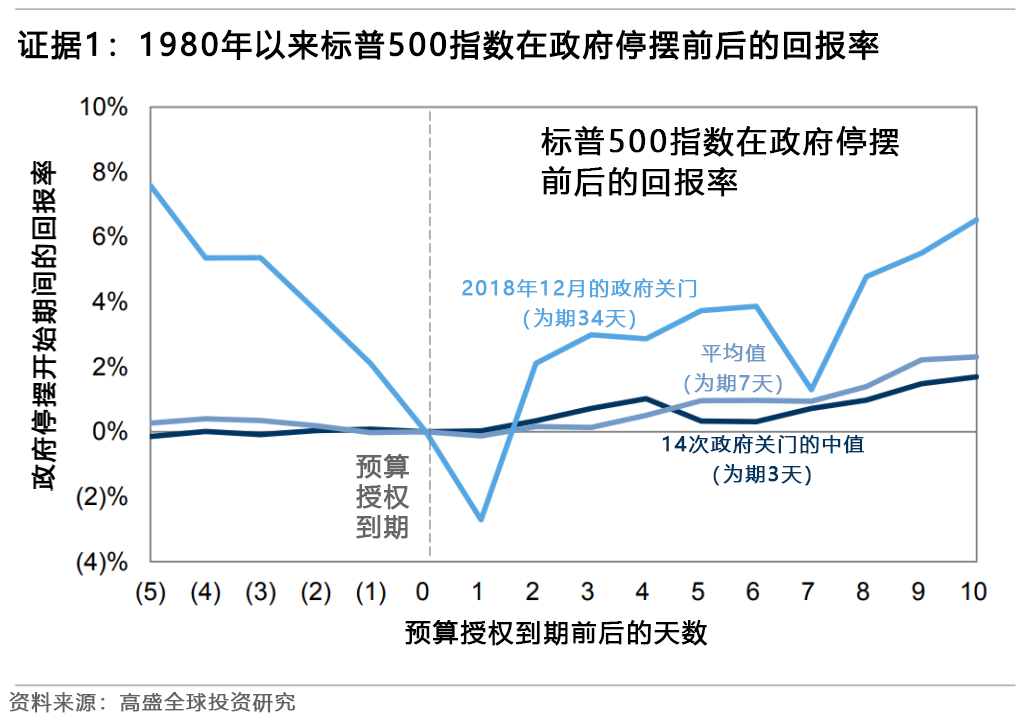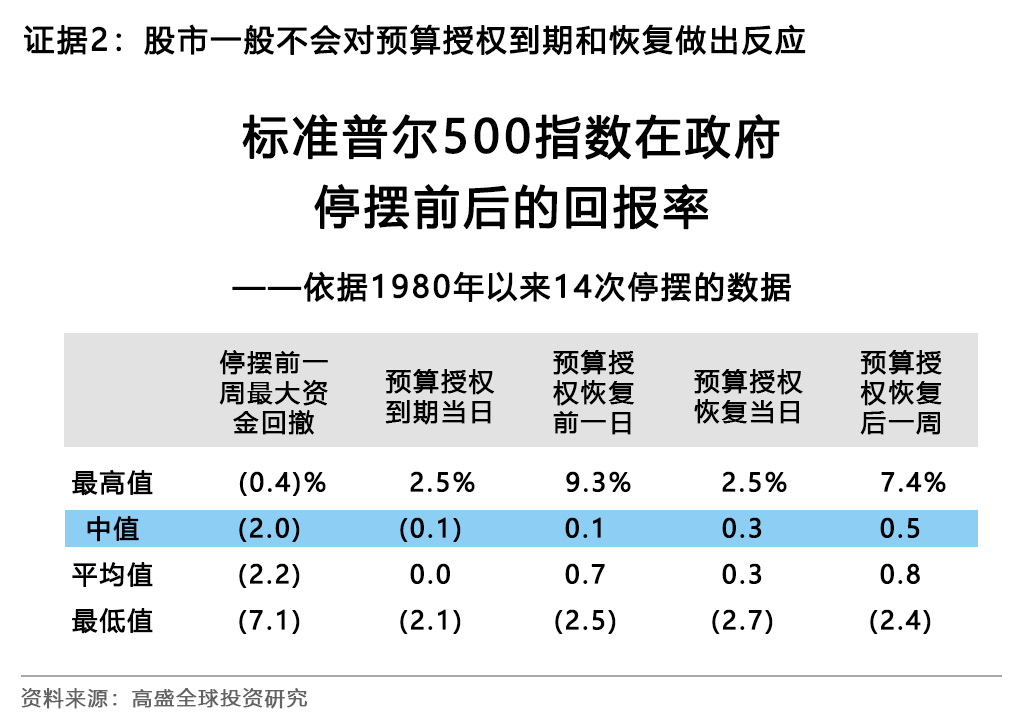夏季正在过去,众多潜在风险正从市场上涌现,其中就包括美联储缩减购债规模的步伐、债务最高限额的争论,以及即将在10月出现的政府停摆。
9月21日,美国众议院通过了一项紧急融资方案,旨在防止政府在9月底关门(如果议员们未能通过新的预算)以及即将出现的政府债务违约情形。但是,这一方案在参议院面临着巨大障碍,加剧了人们对10月可能发生政府停摆的担忧。
股票投资者对目前市场中许多潜在的不利因素表达了不安情绪,但是,高盛集团(Goldman Sachs)的策略师认为,从历史来看,政府停摆本身对市场的影响并不太大,但仍然有其他因素或将影响股市。
“历史表明,美国政府关门通常不会对股票回报产生实质性影响。”高盛的策略师大卫·科斯廷在9月21日晚间发布的一份报告中写道,“在1980年以来发生的14次政府停摆中,标准普尔500指数(S&P 500)的中值回报率数值,在预算授权到期之日为-0.1%,在停摆期间为0.1%,在重新开门之日为0.3%。”
有一个例外是在2018年12月,也就是最近一次政府停摆期间。当时,标准普尔500指数在支出授权到期时下跌了2%。“但是,那次下跌可能主要出于投资者对美联储收紧政策的担忧。”他们说。
策略师指出,指数影响减弱在标准普尔500指数类股票内部也是一致的。

“无论着眼于标准普尔500指数的成分股还是因素变化,政府停摆前后的回报率中值差异都非常小。在此前的14次停摆当中,在预算到期前后的几周内,成分和因素的超额回报中值都在正百分之一到负百分之一之间。”他们写道。

但债务上限期限过去曾经对市场产生过影响。高盛的策略师指出,在2011年和2013年的债务上限截止日期前后,某些“政府收入”敞口股票“表现略逊于标普400中型股”。这些公司包括洛克希德-马丁公司(Lockheed Martin)、诺斯洛普格拉曼公司(Northrop Grumman)、通用动力公司(General Dynamics)和雷神技术公司(Raytheon Technologies)等工业股;以及Anthem、联合健康集团(UnitedHealth Group)、吉利德科学公司(Gilead Sciences)和哈门那公司(Humana)等医疗股。
正如英联邦金融网络(Commonwealth Financial Network)的首席投资官布拉德·麦克米伦等人对《财富》杂志所说:“我认为政府关门不会发生,但即使它真的发生了,我认为其影响也会比人们想象的小得多。人们都知道美国国债债台高筑。人们都知道政府终将付出代价。”
扰乱市场的因素
其实,在股市停摆期间(甚至是其他任何时候),最可能影响股市的是更广泛的宏观经济形势。
高盛的策略师表示,尽管“历史回报率显示,政府停摆或近期债务上限问题,对标准普尔500指数没有产生持续的影响,但宏观环境的基本面,对股市来说则相当重要”。“我们的政治经济学家将日益增加的风险归咎于即将到来的债务上限,并认为这与2011年和2013年的经历类似。但其实,在这两年中,标准普尔500指数在2011年下跌,但在2013年债务上限期间是反弹的。”策略师写道。
区别如何?2011年,欧洲债务危机爆发,标准普尔下调了美国主权债务评级,经济增长也出现了下滑。相比之下,2013年的宏观环境更为有利。
事实上,或许秋季之后的宏观形势才可能成为更大的担忧。
“让我担心的不是政府关门的可能性本身,而是一系列与之密切相关的其他事情。”麦克米伦说。
这些事情包括经济增长担忧涌现,最近几周,华尔街公司还下调了GDP预期,此外,还有美联储缩减资产购买和支持的时限,以及中国恒大集团债务危机的影响。与此同时,市场的季节性和技术调整可能也助长了最近的市场暴跌。
对麦克米伦来说,消费者信心和支出也是他将关注的问题。
“我担心的是对消费者信心的影响。”他说,“联邦政策已经拖累了信心。正如我们之前所看到的,如果政府关门,人们会对是否支付社会保险、是否支付其他补充款项增加关注。人们看到了这些头条新闻,即使没有直接影响,他们也会开始认为事情开始变糟糕了。”
毫无疑问的是,在股市之外,政府关门对整体经济的阵痛依旧。但根据高盛的分析,投资者们现在或许不必担心“政府关门”所带来的影响。
麦克米伦说得更加直白:“这些都是噪音。尽管风险有所上升,但基本面仍然相当坚挺。只要基本面保持健康,这一切都会过去。”(财富中文网)
编译:杨二一
夏季正在过去,众多潜在风险正从市场上涌现,其中就包括美联储缩减购债规模的步伐、债务最高限额的争论,以及即将在10月出现的政府停摆。
9月21日,美国众议院通过了一项紧急融资方案,旨在防止政府在9月底关门(如果议员们未能通过新的预算)以及即将出现的政府债务违约情形。但是,这一方案在参议院面临着巨大障碍,加剧了人们对10月可能发生政府停摆的担忧。
股票投资者对目前市场中许多潜在的不利因素表达了不安情绪,但是,高盛集团(Goldman Sachs)的策略师认为,从历史来看,政府停摆本身对市场的影响并不太大,但仍然有其他因素或将影响股市。
“历史表明,美国政府关门通常不会对股票回报产生实质性影响。”高盛的策略师大卫·科斯廷在9月21日晚间发布的一份报告中写道,“在1980年以来发生的14次政府停摆中,标准普尔500指数(S&P 500)的中值回报率数值,在预算授权到期之日为-0.1%,在停摆期间为0.1%,在重新开门之日为0.3%。”
有一个例外是在2018年12月,也就是最近一次政府停摆期间。当时,标准普尔500指数在支出授权到期时下跌了2%。“但是,那次下跌可能主要出于投资者对美联储收紧政策的担忧。”他们说。
策略师指出,指数影响减弱在标准普尔500指数类股票内部也是一致的。
“无论着眼于标准普尔500指数的成分股还是因素变化,政府停摆前后的回报率中值差异都非常小。在此前的14次停摆当中,在预算到期前后的几周内,成分和因素的超额回报中值都在正百分之一到负百分之一之间。”他们写道。
但债务上限期限过去曾经对市场产生过影响。高盛的策略师指出,在2011年和2013年的债务上限截止日期前后,某些“政府收入”敞口股票“表现略逊于标普400中型股”。这些公司包括洛克希德-马丁公司(Lockheed Martin)、诺斯洛普格拉曼公司(Northrop Grumman)、通用动力公司(General Dynamics)和雷神技术公司(Raytheon Technologies)等工业股;以及Anthem、联合健康集团(UnitedHealth Group)、吉利德科学公司(Gilead Sciences)和哈门那公司(Humana)等医疗股。
正如英联邦金融网络(Commonwealth Financial Network)的首席投资官布拉德·麦克米伦等人对《财富》杂志所说:“我认为政府关门不会发生,但即使它真的发生了,我认为其影响也会比人们想象的小得多。人们都知道美国国债债台高筑。人们都知道政府终将付出代价。”
扰乱市场的因素
其实,在股市停摆期间(甚至是其他任何时候),最可能影响股市的是更广泛的宏观经济形势。
高盛的策略师表示,尽管“历史回报率显示,政府停摆或近期债务上限问题,对标准普尔500指数没有产生持续的影响,但宏观环境的基本面,对股市来说则相当重要”。“我们的政治经济学家将日益增加的风险归咎于即将到来的债务上限,并认为这与2011年和2013年的经历类似。但其实,在这两年中,标准普尔500指数在2011年下跌,但在2013年债务上限期间是反弹的。”策略师写道。
区别如何?2011年,欧洲债务危机爆发,标准普尔下调了美国主权债务评级,经济增长也出现了下滑。相比之下,2013年的宏观环境更为有利。
事实上,或许秋季之后的宏观形势才可能成为更大的担忧。
“让我担心的不是政府关门的可能性本身,而是一系列与之密切相关的其他事情。”麦克米伦说。
这些事情包括经济增长担忧涌现,最近几周,华尔街公司还下调了GDP预期,此外,还有美联储缩减资产购买和支持的时限,以及中国恒大集团债务危机的影响。与此同时,市场的季节性和技术调整可能也助长了最近的市场暴跌。
对麦克米伦来说,消费者信心和支出也是他将关注的问题。
“我担心的是对消费者信心的影响。”他说,“联邦政策已经拖累了信心。正如我们之前所看到的,如果政府关门,人们会对是否支付社会保险、是否支付其他补充款项增加关注。人们看到了这些头条新闻,即使没有直接影响,他们也会开始认为事情开始变糟糕了。”
毫无疑问的是,在股市之外,政府关门对整体经济的阵痛依旧。但根据高盛的分析,投资者们现在或许不必担心“政府关门”所带来的影响。
麦克米伦说得更加直白:“这些都是噪音。尽管风险有所上升,但基本面仍然相当坚挺。只要基本面保持健康,这一切都会过去。”(财富中文网)
编译:杨二一
As we leave the summer months behind, the market is facing a multitude of potential risks, including the pace of Federal Reserve tapering, the debt ceiling debate, and a looming government shutdown set for October.
On September 21, the House passed a stopgap funding package aimed at preventing a shutdown at the end of September (if legislators fail to pass a new budget) and a looming government debt default. But the bill faces big hurdles in the Senate, ratcheting up fears that a government shutdown may occur in October.
While stock investors may be feeling jittery about many of the potential headwinds swirling in the market right now, strategists at Goldman Sachs suggest that based on history, shutdowns in and of themselves aren’t too impactful to markets—but there are other factors that could affect stocks.
"History shows that U.S. government shutdowns generally have not meaningfully impacted equity returns," Goldman Sachs strategists led by David Kostin wrote in a September 21 evening note. "In the 14 government shutdowns since 1980, the S&P 500 generated median returns of -0.1% on the dates of budget authority expiration, 0.1% during the shutdown periods, and 0.3% on the dates of resolution." (See Goldman's chart below.)
One exception, they note, was in December 2018, during the most recent shutdown, when the S&P 500 fell 2% on that spending authority expiration date. "However, this decline was likely driven primarily by investor concerns about Fed tightening," they suggest.
The muted index impact is also consistent within the S&P 500 sectors, the strategists note.
"S&P 500 sectors and factors have evidenced very small median returns around government shutdowns. The median excess returns of sectors and factors across the 14 episodes all range between +1 [percentage point] and -1 [percentage point] in the weeks before and after budget expiry," they wrote.
But debt limit deadlines have impacted some parts of the market in the past. The Goldman strategists note certain "government revenue" exposed stocks "underperformed the midcap S&P 400 around the 2011 and 2013 debt limit deadlines." Those include industrials like Lockheed Martin, Northrop Grumman, General Dynamics, and Raytheon Technologies; and health care stocks like Anthem, UnitedHealth Group, Gilead Sciences, and Humana.
Ultimately, those like Brad McMillan, chief investment officer of Commonwealth Financial Network, argue that "even if [a government shutdown] were to happen, which I don't think it will, I think the impact would be a lot less than people think. People know U.S. debt is money-good. People know the government will pay eventually," he told Fortune.
What could rattle the markets
However, what could affect stocks during shutdowns (and, frankly, at any other time) is the broader macroeconomic picture.
While "historical returns show no consistent impact to the S&P 500 from government shutdowns or the recent debt ceiling showdowns…the underlying macro environment has been more important for equity performance," the Goldman strategists suggest. "Our political economist has ascribed increasing risk to the upcoming debt limit and sees parallels to the experiences in 2011 and 2013." During those years, "the S&P 500 fell in 2011 but rallied throughout the 2013 debt limit experience."
The difference? "2011 was plagued by the European debt crisis, S&P’s downgrade of U.S. sovereign debt, and declining economic growth. In contrast, the macro environment was more favorable in 2013," they note.
Indeed, perhaps the bigger worry right now is the state of that macro picture heading into the fall.
"I think what concerns me about it is not so much the potential for a shutdown itself but the fact that it's in conjunction with a bunch of other things," McMillan said.
Those include concerns about economic growth and Wall Street firms downgrading GDP forecasts in recent weeks, the Fed's timing on tapering asset purchases and support, and the implications of China's Evergrande debt crisis. Seasonality and technical signals in the market, meanwhile, may have also been feeding into the recent rout in the markets.
For McMillan, consumer confidence and spending are also things he's going to be watching.
"Where I do worry about it is the impact on consumer confidence," he said. "There's already this kind of federal policy-related drag on confidence. And as we've seen before, if you start to get a shutdown, that starts to raise headlines about whether…Social Security's gonna get paid, whether other supplemental payments [are going to get paid]. People see the headlines, and even if it doesn't affect them directly, they start to think things are starting to get broken."
To be sure, outside of the stock market, the consequences of a government shutdown to the broader economy could be painful. But based on Goldman's analysis, investors likely don't need to add "government shutdown" to their list of worries right now.
McMillan puts it in more blunt terms: "It's all noise. As long as the economic fundamentals remain sound—and although the risks have gone up a bit, the fundamentals are still quite solid—this too will pass."






